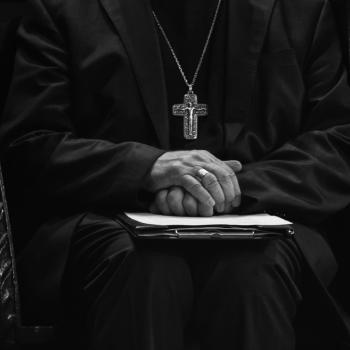To be sure, I wonder what might have been. On at least four occasions, I had been ranked first in the country for my age group. I had won several national titles as a junior. I was just transitioning to the senior ranks when I was injured, four months prior to the Olympic Trials in 1996. Sooner or later, I would have contended for national titles and spots on the Olympic team.
And to be sure, my injury has led to many seasons of pain. It is one thing to endure the acute agony of a broken bone or a torn muscle or tendon. It is another thing, an altogether different matter for the mind and the spirit, to look down the long barrel of your life and see that it is rifled through with pain all the way to the end.
There are three reasons why I thank God for my gymnastics career. The first is simple: gymnastics gave me extraordinary experiences that expanded my horizons and strengthened my character. While my schoolmates flirted in the Taco Bell parking lot over burritos and watered-down Pepsi, I traveled nationally and internationally, performing on stages great and small. Through injury after injury, I discovered what it means to learn from defeat and persevere through adversity, to establish goals and achieve them as a team.
Many things I will never forget. National team camps at the Olympic Training Center. Winning the all-around title at the junior national championships in 1992. Representing the United States at the junior Pan American Games in Brazil. Competing for Stanford as a freshman and winning the NCAA title as a team. The friendship of my childhood coach, Greg Corsiglia, the support of my parents, the way my father dreamed my dreams with me.
I cannot wish I had never done gymnastics, because I hardly know what kind of person I would have been without it. It felt, when I left gymnastics, as though the larger portion of my identity had been amputated.
As Stephen McCain said in our recent interview, the Olympics is not merely the highly televised affair that takes place every four years; it is the whole story of hard work and sacrifice, the entire narrative arc that brings you there. Although I missed out on the final competition, I was privileged to experience the rest of the story. Standing atop the podium can be a good and glorious thing. Yet there is glory also in the fight, in the fight itself, in the will to push against the outermost boundaries of human capability in order to achieve one's goal.
Second, I am grateful for gymnastics because the gyms where I trained, the gyms where I grew up and became who I am, were my personal laboratories of faith. I spent practices and competitions in near-constant dialogue with God. The life of an elite gymnast is difficult and often solitary. God was my sole companion through it all, the one constant, a reservoir of peace and strength.
Night by night I lay awake and watched a banner of Olympic dreams unfurl in brilliant colors above my bed. Night by night I prayed that God would see fit to take me there, but yielded myself to God and asked that He accomplish His will through my gymnastics career. Can I now complain that His will was not my own?
By the time of my accident, God had already, through gymnastics, lavished extraordinary and undeserved goodness upon me. When I won the junior national championships at fifteen, it was the most powerful spiritual experience I had ever had; I felt throughout that I was only a joyful instrument in the Master's hands, as though I merely watched my body move through the motions until the competition was complete and I stood atop the podium. At the national skills-testing competition when I was sixteen, my ankle was sprained so badly that I could only limp to each event -- and yet I won the title and was never more humbled.
Ironically, the last time I surrendered my gymnastics career to God was the summer before my injury. I had been wrestling with my commitment to gymnastics. I was never quite happy or comfortable in the Stanford gym as a freshman, and I enjoyed everything else the university had to offer. All the other gymnasts my age were aiming for the 2000 and not the 1996 Olympics. Also, I was afraid. I feared rushing into more difficult and dangerous routines; I feared the crushing pressures and anxieties of the buildup to the Olympic Trials; I feared failure.
It had been easy to strive for the Olympics when they were abstract and distant. Yet in the summer of 1995, for the first time in my life, with the sacrifices and risks right in front of me, my selfish desire was not to train for the 1996 Olympics. I am so glad I came to that point before the end. It allowed me, also for the first time in my life, to commit myself to gymnastics truly and fully for God and not for myself. I recommitted because I knew that chasing the 1996 Olympics would require a strength and courage greater than I possessed; I knew that I could endure the grueling training and the daunting pressures only by trusting God and depending on Him daily. I was convinced that God wanted me to do it, fundamentally, because I could not do it. I could only go forward in faith.





